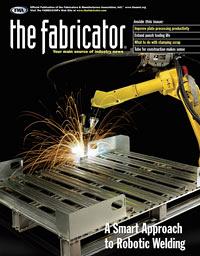Contributing Writer
- FMA
- The Fabricator
- FABTECH
- Canadian Metalworking
Categories
- Additive Manufacturing
- Aluminum Welding
- Arc Welding
- Assembly and Joining
- Automation and Robotics
- Bending and Forming
- Consumables
- Cutting and Weld Prep
- Electric Vehicles
- En Español
- Finishing
- Hydroforming
- Laser Cutting
- Laser Welding
- Machining
- Manufacturing Software
- Materials Handling
- Metals/Materials
- Oxyfuel Cutting
- Plasma Cutting
- Power Tools
- Punching and Other Holemaking
- Roll Forming
- Safety
- Sawing
- Shearing
- Shop Management
- Testing and Measuring
- Tube and Pipe Fabrication
- Tube and Pipe Production
- Waterjet Cutting
Industry Directory
Webcasts
Podcasts
FAB 40
Advertise
Subscribe
Account Login
Search
Fabricating precision parts for automobiles
Examples of Malaysian manufacturers stepping up to strong demand
- By Hafiz Mohd
- November 29, 2001
- Article
- Shop Management
In September the Association of Southeast Asian Nations (ASEAN) trade ministers agreed with Australia and New Zealand to move ahead with a closer economic partnership initiative in the wake of a global economic slowdown. All 12 countries agreed on a need for an initiative to reduce trade barriers and promote freer investment among the regions while focusing on individual reform. They are working toward creating a unified investment zone by breaking down bureaucracies and red tape that stifle trade.
Economic initiatives are occurring in Malaysia, for example, where reforms to the domestic investments have exceeded foreign investments in the country's automotive components and accessories sector, with 63 projects approved in 2000. Of those, 33 were new projects for the manufacture of motor vehicle parts and accessories, and 30 were for the expansion and diversification of existing projects.
Additionally, Malaysia has relaxed its equity policy on foreign investments, especially in manufacturing projects, with the exception of specific activities and products for which Malaysian small- and medium-scale companies have the capabilities and expertise.
Supplying the Auto Industry
More than 350 companies in Malaysia currently manufacture automotive components and parts. One of these companies is Azman Hamzah Plastik Sdn. Bhd. Established in 1989, AHP is an ISO 9002-certified company whose core business is precision fabrication of automotive parts and accessories.
Operating with two major factories, the company recognizes the need for advanced automation and machines to manufacture precision tools, dies, and molds. The company uses high-tech electronic controls and monitoring systems, as well as robotic accessories, to help improve output and efficiency.
Its factories are equipped with a range of machinery for mold- and diemaking, including Japanese and European gas tungsten arc welding (GTAW) equipment, electrical discharge machining (EDM) equipment, lathes, mills, and surface grinders. These machines are integrated on the shop floor and range in fabrication capacity from 40 to 200 tons in typical operation. To cope further with demand, facilities are equipped with new tool- and diemaking sections.
"Recognizing that innovation encourages growth and competitiveness, we recently stepped up our efforts in the area of research and development," explained Mohd Fitri Mohd Aris, managing director.
The company has set up a specific department staffed by engineers who have been trained to use CAD/CAM software for mechanical and shape design, manufacturing, analysis and simulation, and equipment and system engineering.
With this added capability, AHP will be able to undertake design jobs ranging from master models to design and fabrication with a systematic flow analysis.
While the company manufactures parts mainly for Proton automobiles, in recent years it has widened its customer base to include Perodua, a domestic Proton competitor, and Toyota.
Increasing in Sales, Quality
Proton achieved its best-ever financial performance during the year ending March 31, 2001, with a 15 percent increase in sales. The company sold 195,228 units in the current financial year, compared to 170,296 units sold in the previous financial year. The improved financial performance has been attributed primarily to the continued strong demand for Proton cars, as well as improved efficiency in the company's manufacturing process.
Meanwhile, Prime Minister Mahathir Mohamed urged Perusahaan Otomobil Nasional Bhd. (Proton), the leading carmaker in Malaysia, to emulate Korean car manufacturers, which have production costs one-third that of their Malaysian counterparts. "We must learn how to reduce our production costs while producing good-quality automobiles," he said. "Proton must prepare itself well to face future competition."
About the Author
subscribe now

The Fabricator is North America's leading magazine for the metal forming and fabricating industry. The magazine delivers the news, technical articles, and case histories that enable fabricators to do their jobs more efficiently. The Fabricator has served the industry since 1970.
start your free subscription- Stay connected from anywhere

Easily access valuable industry resources now with full access to the digital edition of The Fabricator.

Easily access valuable industry resources now with full access to the digital edition of The Welder.

Easily access valuable industry resources now with full access to the digital edition of The Tube and Pipe Journal.
- Podcasting
- Podcast:
- The Fabricator Podcast
- Published:
- 04/16/2024
- Running Time:
- 63:29
In this episode of The Fabricator Podcast, Caleb Chamberlain, co-founder and CEO of OSH Cut, discusses his company’s...
- Industry Events
16th Annual Safety Conference
- April 30 - May 1, 2024
- Elgin,
Pipe and Tube Conference
- May 21 - 22, 2024
- Omaha, NE
World-Class Roll Forming Workshop
- June 5 - 6, 2024
- Louisville, KY
Advanced Laser Application Workshop
- June 25 - 27, 2024
- Novi, MI































